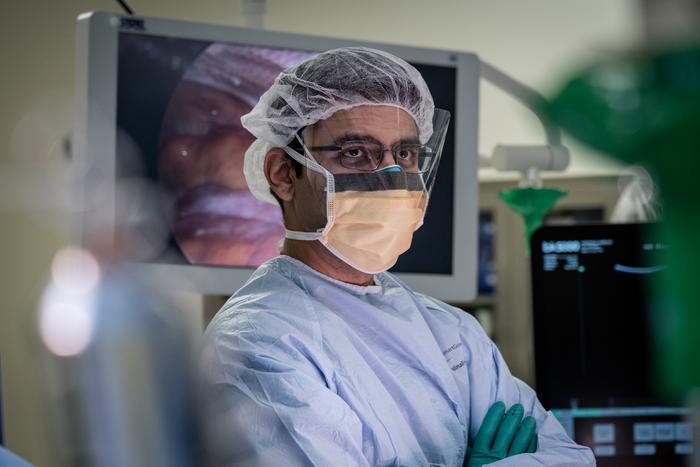
In a groundbreaking development from City of Hope, a prominent cancer research and treatment institution in California, a phase 1 clinical trial has shown promising results in the fight against metastatic colorectal and appendiceal cancers. The trial, which explores a novel method combining pressurized intraperitoneal aerosolized chemotherapy (PIPAC) with standard systemic chemotherapy, highlights a potential breakthrough in treating cancer that has spread to the peritoneal cavity. This groundbreaking approach was pioneered by a team at City of Hope, which has been recognized for its dedication to innovative cancer treatment.
The significance of this research cannot be overstated, particularly given that the peritoneum—the lining of the abdominal cavity—is regarded as one of the most challenging sites for cancer treatment. Patients whose cancer has spread to this region often face dire prognoses, with many surviving only a few months if left untreated. The limitations of traditional systemic chemotherapy, mainly due to insufficient drug delivery to the peritoneal area, necessitate new methodologies that can provide a uniform and effective treatment. The alarming statistics reflect this challenge: only a handful of patients manage to survive beyond one year, underscoring the urgent need for alternative therapies.
The clinical trial encompassed 19 patients, aged around 60, all of whom were diagnosed with inoperable colorectal or appendiceal cancers that had metastasized to the peritoneum. These participants had already undergone several lines of systemic chemotherapy without significant improvement in their condition. By integrating PIPAC, which administers chemotherapy in a pressurized aerosolized format, the researchers aimed to enhance the localized delivery of the drug directly to the cancerous tissues while minimizing systemic toxicity.
Dr. Mustafa Raoof, the lead investigator of the study, articulated the potential of this technique, stating that PIPAC may revolutionize the approach to chemotherapy delivery within the abdominal cavity. Unlike traditional methods, PIPAC facilitates a fine aerosol mist that can penetrate deeper layers of tissue, providing an optimized means of chemotherapy exposure. By targeting the cancer directly within the peritoneum, the treatment is potentially more effective while preserving the patient’s overall well-being.
The early results of the trial are encouraging as they suggest not only safety but also a clinical response from patients based on multiple evaluation criteria. These include histological assessment, radiographic imaging, and tumor marker evaluations, particularly the carcinoembryonic antigen (CEA) levels, which can indicate cancer presence and response to treatment. There is a palpable excitement among the research team regarding these preliminary findings, which lay the groundwork for further multicenter randomized trials aimed at confirming the efficacy of combining PIPAC with systemic therapy.
Critically, Dr. Raoof emphasized the importance of these findings but also cautioned against the off-label use of PIPAC until more comprehensive evidence is accrued. While the initial phase one trial established safety and indicated potential efficacy, definitive conclusions regarding long-term benefits and improved survival need to be substantiated through larger trials. The planned subsequent studies at City of Hope aim to rigorously evaluate whether this innovative approach can genuinely enhance survival rates and maintain quality of life for patients facing these aggressive cancers.
The City of Hope is not only a pioneer in this particular methodology but has also taken significant steps to educate other medical professionals about PIPAC, having conducted the first training workshops on the technique in the U.S. Collaborating with esteemed institutions such as Northwell Health and Mayo Clinic, City of Hope is forging a path for a wider acceptance and application of this promising treatment modality.
In upcoming presentations, Dr. Raoof will detail these findings at the Society of Surgical Oncology Annual Meeting, an event where leading cancer researchers gather to exchange knowledge and advancements. The insights gained from this research are likely to stimulate further discussion and investigation in the cancer treatment community.
The implications of this research reach beyond just a singular treatment method; they reflect a critical shift towards precision medicine in oncology. As research evolves, it becomes increasingly clear that tailored approaches to individual patient needs may provide more effective management of complex cancers. City of Hope represents a beacon of hope for many patients, showcasing how continued innovation can lead to significant improvements in cancer care outcomes.
Overall, this trial serves as a critical reminder of the ongoing battles faced by cancer patients and the relentless pursuit of new strategies to combat this formidable disease. Through collaborative research efforts, innovative therapies like PIPAC may reshape the landscape of cancer treatment, granting new hope to those impacted by aggressive malignancies.
Subject of Research: Combination of pressurized intraperitoneal aerosolized chemotherapy (PIPAC) with systemic chemotherapy for colorectal and appendiceal cancer.
Article Title: Phase 1 Trial Highlights Efficacy of New Chemotherapy Technique for Peritoneal Cancer
News Publication Date: March 18, 2025
Web References: City of Hope
References: Research cited per City of Hope study trials and findings.
Image Credits: City of Hope
Keywords: Cancer treatment, Chemotherapy, PIPAC, Colorectal cancer, Appendiceal cancer, Peritoneum, Oncology research, Clinical trial.
Tags: appendiceal cancer researchcancer research advancementsCity of Hope clinical trialinnovative cancer therapiesmetastatic colorectal cancer treatmentnovel cancer treatment methodspatient survival statisticsperitoneal cavity cancer challengesPhase 1 clinical trial resultspressurized intraperitoneal aerosolized chemotherapySociety of Surgical Oncology meetingsystemic chemotherapy limitations





